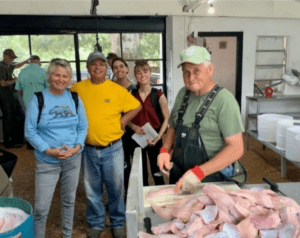Meridian and partners conduct first ever study of seafood economic resilience in coastal and inland Louisiana
12 July 2022This spring, Meridian hosted a reception in Baton Rouge, Louisiana, bringing together seafood business owners, economic developers, and public officials to eat locally sourced seafood and discuss findings from over three years of research in Louisiana’s coastal and inland fisheries. Since 2018, Meridian has—in partnership with the University of Louisiana Lafayette Business School and the LSU Louisiana Sea Grant—led efforts to understand the challenges faced by the Louisiana seafood industry and outline opportunities to develop new markets, invest in seafood infrastructure, grow the seafood workforce, and inspire the next generation of seafood entrepreneurs.
With our partners, we co-designed a strategy to engage the whole Louisiana seafood supply chain in the research and strategy process. This required meeting people where they are—where they live and work on the coast, along rivers and bayous, and in rural Louisiana towns. We covered a lot of ground, visiting fishermen, processors, distributors, economic developers, public officials, and academics in 16 parishes to learn about their experiences, observations, and difficulties working in Louisiana fisheries, as well as their hopes for the industry’s future. As fishermen have limited access to videoconferencing, these face-to-face meetings continued even after the start of the COVID-19 pandemic.

After publishing an economic development strategy for Louisiana’s coastal seafood industry in 2020, (see also Braving the Storm: Economic Development Strategies for Coastal Resilience), the team traveled to Central Louisiana to identify economic development opportunities relevant to Louisiana’s central freshwater fisheries. Generations of Americans have relied on plentiful supplies of Louisiana’s freshwater fish, including buffalo fish, carp, catfish, crawfish, garfish, and drum. Like their coastal counterparts, however, these central Louisiana fisheries struggle with inflation, competition from imports, and labor shortages. They also face a host of region-specific challenges—including stagnating product value, invasive Asian carp, insufficient access to infrastructure, and underrepresentation in the statewide seafood policymaking process.

In partnership with key stakeholders, we identified strategies to enhance state-level economic development support for freshwater fisheries, recruit and train members of the workforce, close infrastructure gaps, improve business acumen and marketing of heritage products, enhance incentives, and remove regulatory barriers to fishing and processing. Taken together, these measures would strengthen the Louisiana economy and expand access to a delicious, sustainable food source, all while reconnecting Louisianans to a vital component of their regional heritage.
The full Louisiana Freshwater Seafood Economic Development Report will be publicly available in August 2022.